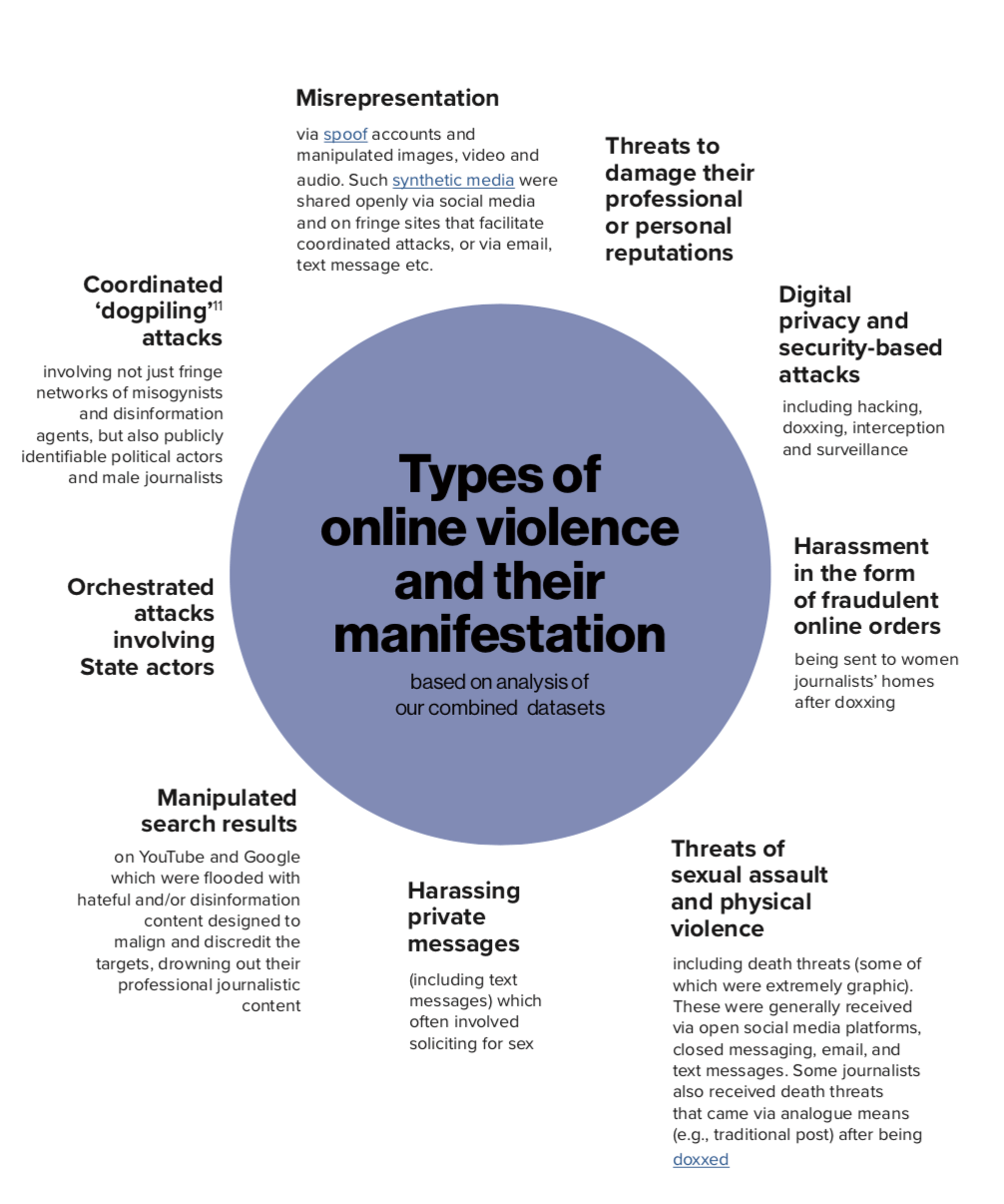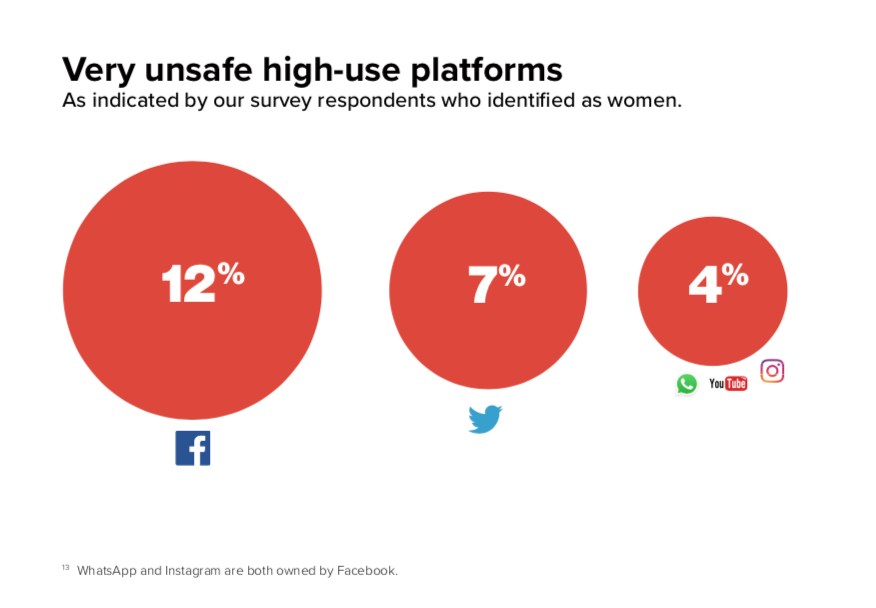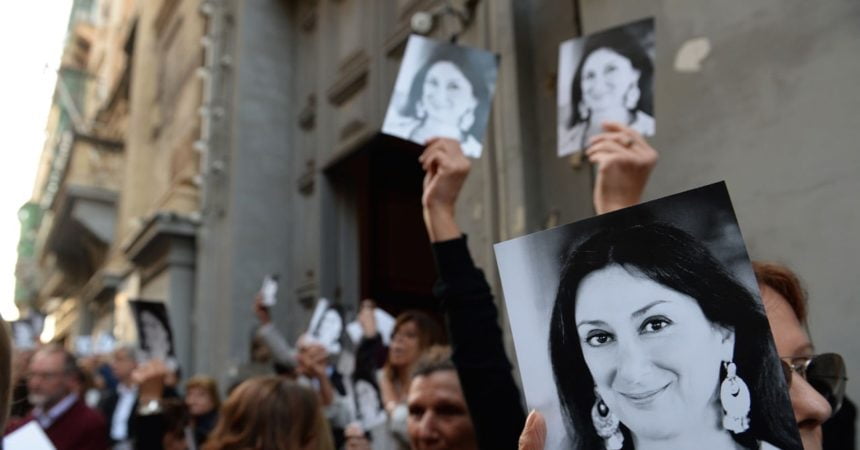Online violence has become the new frontline in journalism safety – and women journalists sit at the epicentre of risk, according to a recent report by UNESCO that shows 73% of survey respondents identifying as women said they had experienced online violence.
Networked misogyny and gaslighting threaten women journalists severely and disproportionately. Threats of sexual violence and murder are frequent and sometimes extended to their families.
Threats of physical violence (identified by 25% of survey respondents) including death threats, and sexual violence (identified by 18%) plagued the women journalists. And these threats radiated: 13% of survey respondents and many interviewees said they had received threats of violence against those close to them, including children and infants.
This phenomenon is also bound up with the rise of viral disinformation, digital conspiracy networks and political polarisation.

The psychological, physical, professional, and digital safety and security impacts associated with this escalating freedom of expression and gender equality crisis are overlapping, converging and frequently inseparable. They are also increasingly spilling offline, sometimes with devastating consequences.
The study shows that online violence against women journalists is a global problem. The interviewees represent 17 States and span every UNESCO region. They are racially, ethnically and linguistically diverse.
The research underpinning this paper consists of: a global survey of 901 journalists from 125 countries. Long-form interviews were held with 173 international journalists, editors, and experts in the fields of freedom of expression, human rights law and digital safety. Two big data case studies assessed over 2.5 million posts on Facebook and Twitter directed at two prominent women journalists – Maria Ressa in the Philippines, and Carole Cadwalladr in the UK.
Increase in online attacks
Online violence against women journalists is designed to: belittle, humiliate, and shame; induce fear, silence and retreat; discredit them professionally, undermining accountability journalism and trust in facts; and chill their active participation (along with that of their sources, colleagues and audiences) in public debate.
“This amounts to an attack on democratic deliberation and media freedom, encompassing the public’s right to access information, and it cannot afford to be normalised or tolerated as an inevitable aspect of online discourse, nor contemporary audience-engaged journalism.,” the report states.
73% of women journalists surveyed by @UNESCO said they faced online violence while doing their job.
There should be no room for misogyny and violence in journalism.
Social media platforms & governments must protect women journalists from online violence.https://t.co/hh8lXwng0p
— António Guterres (@antonioguterres) March 27, 2021
Online attacks on women journalists appear to be increasing significantly, as this study demonstrates, particularly in the context of the ‘shadow pandemic’ of violence against women during COVID-19. The pandemic has changed journalists’ working conditions, making them yet more dependent on digital communications services and social media channels.
Disinformation tactics are routinely deployed in targeted multiplatform online attacks against women journalists, the report notes. Over 40% of survey respondents said they had been targeted in online attacks that appeared to be linked to orchestrated disinformation campaigns.
Another major issue in evidence is the role of political actors – including presidents and elected representatives, party officials and members – in instigating and fuelling online violence campaigns against women journalists.
Additionally, partisan, mainstream and fringe news media can be shown to amplify such attacks, triggering ‘pile-ons’ that escalate the risks of online violence morphing into offline assault or causing significant psychological injury. One-fifth (20%) of survey respondents said they had been attacked or abused offline in connection with online violence they had experienced.
Physical threats associated with online violence caused 13% of women survey respondents to increase their physical security; 4% said that they had missed work due to particular concerns about the attacks moving offline and resulting in physical violence.
The mental health impacts were also the most frequently identified (26%) consequence of online attacks among survey respondents.
Interviewees and case study subjects identified high-level political leaders and other State actors as some of the biggest instigators of online violence. Political actors were also the second most frequently noted sources (37%) of attacks and abuse after ‘anonymous or unknown attackers’ (57%), according to respondents.

Partisan news outlets, media operating at the fringes of the political spectrum, and misogynistic journalists are instrumentalised to amplify and fuel attacks.
Facebook was the most frequently used (77%) platform, network or app for journalistic work (closely followed by Twitter on 74%), but it attracted disproportionately higher rates of incident-reporting to the platforms among the respondents (39% compared to Twitter’s 26%).
Facebook was also rated the most dangerous of the top five platforms/apps used, with nearly double the number of respondents rating Facebook “very unsafe” compared to Twitter.
The need for action
States are obliged to protect journalists, so that they can do their work freely and safely in accordance with international obligations, legislating accordingly and ensuring law enforcement agencies respond appropriately.
Online violence against journalists is a significant feature of what is referred to as ‘platform capture’, which involves the weaponisation of social media by bad-faith actors, in combination with the structural failures of the platforms’ business models and product design, and the virtual entrapment of many news organisations and journalists into platform dependency.
Social media companies have so far failed to respond swiftly or effectively to the crisis. Central to this failure is an attempt to use ‘free speech’ as a shield against accountability, and a continuing reluctance to assume responsibility for the content on their sites. Additionally, there is a lack of coordination between these companies in addressing orchestrated, cross-platform online violence campaigns targeting individual journalists.
This highlights the urgent need for policy reform, and novel legal, legislative and normative responses, in full compliance with international freedom of expression and privacy standards, from key stakeholders, UNESCO said.













